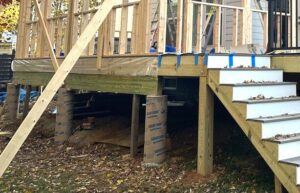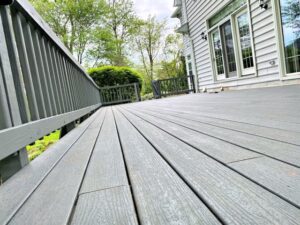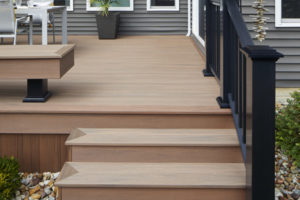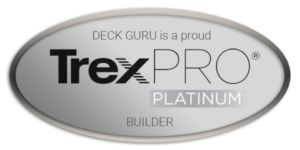Composite decking, characterized by its blend of wood fibers and plastic, offers a low-maintenance alternative to traditional wood decking. Unlike solid wood decks that demand extensive upkeep, composite decks require significantly less attention, yet they are not maintenance-free.
Keep reading for a detailed overview of the cleaning and maintenance procedures necessary to keep your composite deck looking its best.
Is a Composite Deck Easy to Clean?
Composite decks, compared to wood, require a lot less maintenance. Composite decks such as Trex are engineered for easy cleaning. Trex decking combines wood fibers and plastics to create a material that does not absorb moisture, preventing mold and mildew growth—a common challenge with wood decks.
Many Trex products also feature a protective outer shell that guards against fading, staining, scratching, and mold, which simplifies the cleaning process to just soap and water. This protective layer also shields the deck from UV damage, decreasing the likelihood of discoloration and structural degradation over time.

Regular Maintenance: The Foundation of Deck Care
Consistent sweeping is essential for the maintenance and upkeep of your composite deck, preventing the accumulation of leaves, twigs, mud, and organic materials that could stain the surface. A thorough cleaning is typically only necessary once or twice annually, depending on local weather conditions. Begin with a stiff-bristled brush to remove surface debris. For materials lodged in crevices, use a putty knife for removal, preventing the spread of debris across the deck.
When using any cleaning solution, it’s advisable to protect nearby plants with a plastic covering to safeguard them from potential harm due to the acidity of natural cleaners like vinegar or lemon.
Composite Deck Cleaning Tools
Fortunately, cleaning a composite deck doesn’t necessitate specialized equipment. The essential tools likely already reside in your home:
- Broom
- Buckets for warm and soapy water
- Deck brush with soft bristles
- Hose
For deeper cleaning, you may consider:
- Scrub brush
- Power washer (with specific usage guidelines)
- Plastic sheeting for plant protection
- Putty knife
Depending on how dirty your deck is, you may need to try more intensive cleaning solutions to remove gunk-like mold and mildew. If you have a large deck, we highly recommend using a pressure washer to save time.
Pressure Washing Composite Decking: Best Practices
If opting for pressure washing, it’s crucial to use a fan tip nozzle and maintain a minimum distance of two feet from the deck surface to avoid damage. Always wash along the grain of the deck boards to prevent damage.
Before using a pressure washer, take proper safety protocols to reduce any risk of injury. If you are not trained on using a pressure washer you can damage your deck beyond repair or hurt yourself. If you are even a bit hesitant on power washing your composite deck, please call a professional to do the cleaning for you.
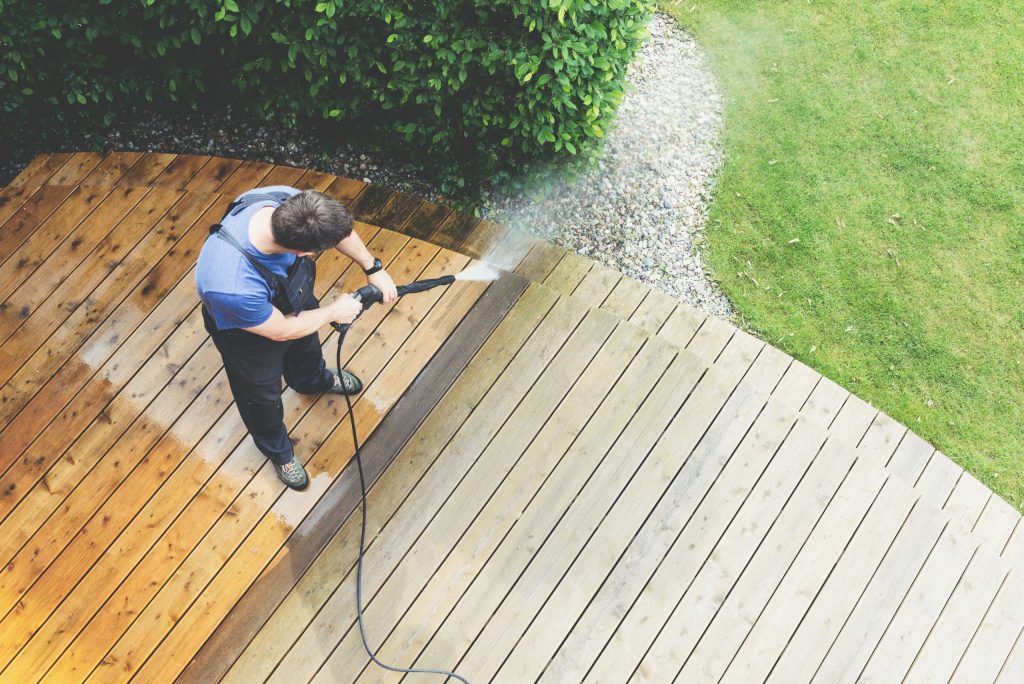
The Cleaning Process: Step-by-Step
- Clear the deck of furniture and other items.
- Sweep to remove loose debris.
- Apply warm water to the deck surface.
- Prepare a mixture of soap and warm water.
- Scrub the deck vigorously with a soft-bristle brush.
- Rinse with a hose and allow the deck to dry naturally.
What to Avoid in Composite Deck Cleaning
Certain practices can harm your composite deck. This is what you should look out for before starting:
- Avoid harsh chemicals and abrasive tools that can damage the deck surface.
- Use a pressure washer correctly to prevent damage.
- Adhere to the manufacturer’s guidelines for cleaning and maintenance to ensure warranty compliance and prevent damage.
Addressing Common Composite Decking Issues
High-traffic areas and exposure to the elements can lead to parts of your deck being worn down and ruined. By paying attention to the most common issues and taking care of them as soon as possible, you can rest assured that they stay a minor inconvenience and not a permanent eye sore. Common deck issues include:
- Mold and Mildew: Regular cleaning with soap and water helps prevent mold growth. Inspect and repair any damaged boards promptly.
- Grease and Oil Stains: Blot spills immediately and clean with grease-cutting dish soap.
- Pollen, Dirt, and Debris: Power washing may be necessary for stubborn pollen. Consider relocating pollen-producing plants away from the deck area.
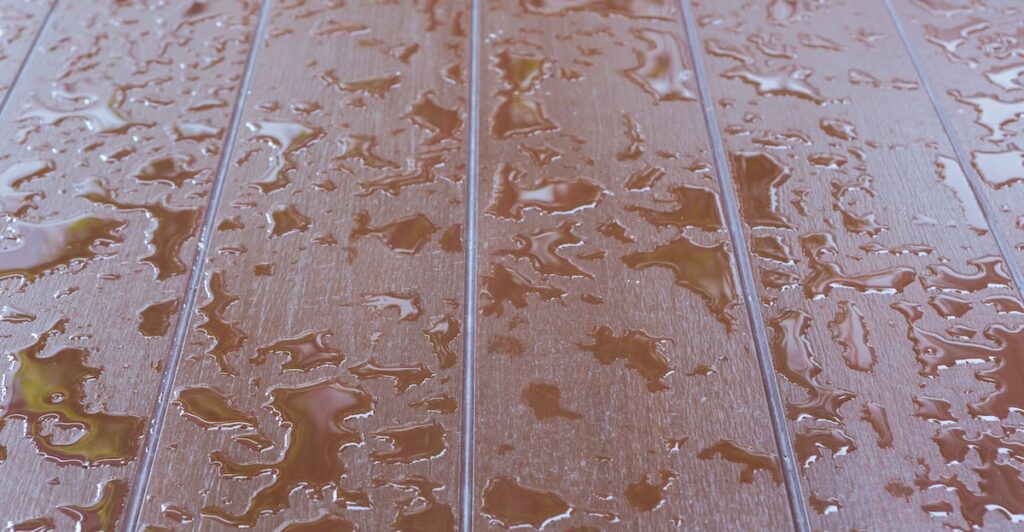
How Often Do Composite Decks Need Cleaning?
Composite decks benefit from regular cleaning to prevent dirt and debris buildup. Seasonal maintenance, including a thorough cleaning in spring and fall, helps maintain the deck’s appearance and longevity. Immediate attention to spills and a yearly deep clean can also preserve the deck’s condition, reducing the need for extensive future maintenance.
By adhering to these guidelines, homeowners can enjoy the benefits of a low-maintenance composite deck, ensuring it remains a beautiful and functional outdoor living space for years to come.
The Deck Experts
At DeckGuru, we’re committed to providing only the highest quality products and services that make your outdoor living space that much more enjoyable.
If you’re ready to transform your outdoor space with a beautiful, low-maintenance deck, call us at 571-707-8772 or contact us online today.


